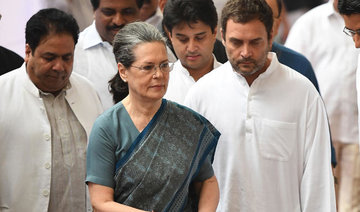NEW DELHI: India’s grand old Congress Party is on the verge of a significant generational shift as 47-year old Rahul Gandhi looks set to become its new president.
The 132-year-old party’s chief decision-making body, the Congress Working Committee (CWC), announced on Monday that it would hold its presidential election on Dec. 16. No one is expected to challenge Gandhi for the post.
Gandhi will succeed the party’s longest-serving president, his mother Sonia, who has been its leader since 1998.
But the party’s crushing defeat in the 2014 parliamentary elections, when it won just 42 seats out of 545 in the Lower House — its lowest haul in 70 years, raised many questions about the party’s policies and its future. Its decline in popularity has been mirrored in the rise of regional parties and the right-wing Bharatiya Janata Party (BJP).
Since the 2014 elections, Sonia Gandhi has maintained a low profile, allowing her son to become the face of the party.
“This is the end of an era,” a senior Congress leader told Arab News. “Sonia Gandhi has been our mainstay and with Rahul Gandhi’s elevation, the party enters a new phase of history; let’s see how it unfolds.”
Speaking after the CWC meeting, Randeep S. Surjewala, the party’s spokesperson, said: “Sonia Gandhi is our leader and mentor. She has always guided the Congress Party. Her able leadership and guidance will always be available. Not only to Rahul, but also to the thousands and thousands of party workers.”
Political pundit Rashid Kidwai, associate editor of The Telegraph and the author of “24 Akbar Road,” a book about the Congress Party, said the decision to officially install Rahul Gandhi as party leader is “a bold move.”
“It comes at a time when campaigns for the Gujarat Assembly elections are still on. Normally, a political party does not hold organizational elections when it is in the middle of an election campaign,” he explained.
He added that he suspects the party “wants to portray more gravitas to Rahul’s personality and leadership during the campaign for Gujarat elections.”
Rahul Gandhi has been getting a positive response in the election campaign in the western Indian state, which is also Prime Minister Narendra Modi’s home turf. The Congress fancies its chances of victory in next month’s Gujarat elections after 22 years in opposition. And if the party performs well, it will not only be a defining moment for Rahul Gandhi but also alter the political narrative in India, which is currently more favorable for the ruling Bharatiya Janata Party (BJP).
“After facing so much adversity from his right-wing opponents, Rahul Gandhi is gaining ground and he is taken more seriously than before. He has got a firm foothold, but only time will tell whether he succeeds or not. But he has got age on his side”, said Kidwai.
However, BJP accuses the Congress of promoting dynastic politics and does not consider the young scion a credible challenger to Modi.
The Congress Party has been India’s ruling party for 50 of the 70 years since the country’s independence, and the Nehru-Gandhi family has produced three prime ministers.
“In the Congress Party, performance and capability do not matter,” said BJP spokesperson G.V.L. Narasimha Rao. “Thus, despite a disastrous track record, Rahul’s elevation was a foregone conclusion.
“The timing of the elevation, though, is curious,” he said. “It seems Sonia Gandhi wanted to pass the leadership mantle to her son before yet another impending defeat in Gujarat state, as it would have been embarrassing for the Congress to reward him after a defeat.”
Whatever the reasons behind his elevation, Rahul Gandhi has a formidable task ahead of him.














